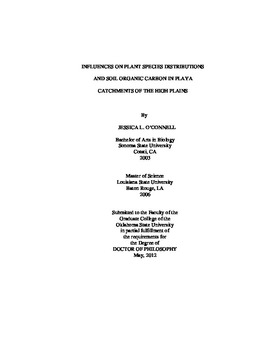| dc.contributor.advisor | Smith, Loren | |
| dc.contributor.author | O'Connell, Jessica L. | |
| dc.date.accessioned | 2013-11-26T08:28:23Z | |
| dc.date.available | 2013-11-26T08:28:23Z | |
| dc.date.issued | 2012-05 | |
| dc.identifier.uri | https://hdl.handle.net/11244/7040 | |
| dc.description.abstract | Scope and Method of Study: Depressional wetlands are threatened globally by conversion to agriculture, altering wetland processes and degrading societal services. We elucidated effects of land management and conservation programs on plant species distributions and soil organic carbon (SOC) in prairies and wetlands of the United States Great Plains. Plant composition mediates many wetland processes and information concerning plant distributions aids wetland and prairie conservation, maximizing management goals. We surveyed 309 wetlands (261 in the western High Plains (WHP), 48 in the Rainwater Basin (RWB)) and surrounding uplands (WHP only) in 3 land-use types: Reference (i.e. native prairie in the WHP and best available in the RWB), United States Department of Agriculture conservation programs (Conservation Reserve Program (CRP) lands in the WHP, Wetland Reserve Program lands (WRP) in the RWB), and cropland. We quantified plant composition, inundation probability, above and belowground biomass, wetland area, wetland sediment accumulation, soil moisture, and SOC. We identified influences on plant distributions, including land management, dispersal limitation, and disturbance processes. We provide restoration models and suggestions for remediation of plant communities where appropriate. | |
| dc.description.abstract | Findings and Conclusions: Plant communities interact with abiotic wetland processes and plant conservation maintains wetland services. Croplands and CRP influenced inundation probability in WHP wetlands. Introduced high-biomass tall-grasses planted in CRP reduced overland runoff, while exposed soil in croplands increased sediment erosion into wetlands. Reduction of playa inundation reduces water available for people and wildlife in the WHP, a semiarid landscape with limited surface water. Plowing and sediment accretion in cropland playas also reduced plant species richness and plowing reduced wetland perennial species. Further, many wetland perennials observed were dispersal-limited and did not quickly return to wetlands, even after plowing ceased. These perennial wetland species probably must be inoculated into previously cultivated wetlands before they will be represented in plant communities. Additionally, SOC was higher in grasslands than cropland and CRP and plant species richness was an important determinant of SOC in playas and uplands. Thus, plant species distributions are critical for enhancing SOC and water availability in playas. Conservation programs containing provisions to protect playa plants, including planting common native species and using grass buffers to control erosion into wetlands, should be promoted over long timescales. | |
| dc.format | application/pdf | |
| dc.language | en_US | |
| dc.rights | Copyright is held by the author who has granted the Oklahoma State University Library the non-exclusive right to share this material in its institutional repository. Contact Digital Library Services at lib-dls@okstate.edu or 405-744-9161 for the permission policy on the use, reproduction or distribution of this material. | |
| dc.title | Influences on plant species distributions and soil organic carbon in playa catchments of the High Plains | |
| dc.contributor.committeeMember | McMurry, Scott | |
| dc.contributor.committeeMember | Haukos, Dave | |
| dc.contributor.committeeMember | Fuhlendorf, Sam | |
| osu.filename | Department of Zoology_16.pdf | |
| osu.accesstype | Open Access | |
| dc.type.genre | Dissertation | |
| dc.type.material | Text | |
| dc.subject.keywords | conservation reserve program | |
| dc.subject.keywords | cultivation | |
| dc.subject.keywords | native prairie | |
| dc.subject.keywords | plant species distributions | |
| dc.subject.keywords | playa wetlands | |
| dc.subject.keywords | soil orga | |
| thesis.degree.discipline | Zoology | |
| thesis.degree.grantor | Oklahoma State University | |
